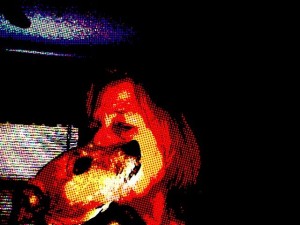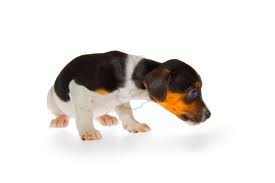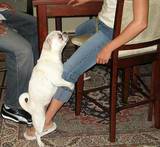Dog Walkin’ Wellington
Why Does My Dog Do THAT?
By Barbara Phillippi
A few days ago, I realized that when dog owners get together, we share and laugh at the idiosyncrasies and comical antics of our canine companions, but we also often discuss some less appealing pet habits that are puzzling, bothersome, or just plain nasty. Sadly, some dog owners become so discouraged and frustrated by behavior that disgusts them that they give up their pets. There are volumes written about these problems, and I’m no expert, but let’s take a quick look at three situations that can sour a relationship between dog and owner.
1. “I let my pup out a dozen times a day, and he comes back in and pees/poops on the carpet. It’s a mess. I yell at him when I catch him, but he just gives me a blank look.”
I think that this one is easy. One word, “Let,” says it all. The young dog has no idea what you expect of him. When he goes out by himself, there are so many things to do, sniff, run, dig, bark. He isn’t thinking “potty.” He must be taught, and it’s your job. After he eats, or is released from his crate, put on his collar and leash, and TAKE him out. Choose a command that you’ll always use: “get busy,” “hurry up,” “go pee (poop),” etc, and be consistent – he’ll eventually learn to associate the words with the deed. Don’t let him off the leash until he performs.

2. “My dog sometimes eats the poop of other dogs when I take him out for walks, or when he’s running around in the dog park. He also licks spots where other dogs have urinated. I make him stop when I catch him, but I don’t always catch him. Why does he do this? Is it dangerous? Is it common? How can I get him to stop?”
This is a tough one, and fairly common. It’s a condition known as coprophagia, and includes dogs that eat their own feces. I researched answers from several online vets and dog expert websites, who said the condition can by caused by any of the following:
A behavior problem, a diet deficiency, because a male isn’t neutered,
a male is being territorial and relishes in strange dogs’ poop/urine,
trying to remove evidence of another dog’s scent marking territory,
because it tastes good, boredom, loneliness, anxiety or stress,
oral fixation habit, like a baby, everything goes into the mouth.
A dog who is confined to a kennel, chained, or restricted to a small yard or other space may eat his feces to occupy himself, or clean his personal space.
In other words, vets agree on one thing – there is no definitive cause. The behavior rarely causes severe health problems, but infectious bacteria sometimes occurs in stool, so it’s another good reason to keep your pet’s innocculations up to date. To most, it’s an extremely disgusting habit. The thought of a dog eating feces from the ground outside, then coming inside to lick one’s face, isn’t pleasant for any of us.
There are medications, including Excel Deter, and For-Bid, available from your vet, which can be sprinkled on your animal’s food prior to ingestion; they’re supposed to make feces unpalatable. But if the dog providing the feces lives next door, or down the street, the logistics are daunting. Do you offer the medication to those owners? There are several home remedies, including these three, which seem to provide varying results: stirring the food in molasses until it’s coated, sprinkling papaya powder on it, adding fresh pineapple. I found an internet offer for a downloadable “dog poop diet” (www.dogpoopdiet.com) which I didn’t check out, and might involve a profit motive by the author, who also has a FaceBook page. Couldn’t hurt to take a look. Just don’t give up. NOTE: Dogs also love new born babies’ poop, if a diaper is left unattended. They are also renowned cat box vacuums.
3. Last week my friend Nancy and I were discussing dogs who hump legs (and other things.) Her female Yorkie “Sassy” is a prolific humper, who visits Nancy’s leg at bedtime. My brother-in-law’s miniature Daschund, Minnie, carries a stuffed object of her affection around the house for occasional trysts, often moving to a new love after a few days. My dog Gracie doesn’t hump legs, but rhythmically moves her hips while licking the inside of my elbow.

Notice that these three canines are all female. Experts report that this is primarily a trait of male dogs, but my male dogs over the years have never engaged in such passions. When puppies hump a pillow or toy, we laugh, it’s cute, so we don’t discourage the brief encounters. But dog behaviorists say that the practice must be nipped in the bud, and that we should make a conscious effort to prevent and stop the embarrassing love making. WEB MD has a good website, complete with anecdotal examples of “humping,” that is a great read, offers some reasonable solutions, and spares my struggling to reduce pages of well researched information on the subject to a couple of paragraphs.
http://pets.webmd.com/dogs/features/humping-why-do-dogs-do-it
If your canine housemates don’t exhibit these behaviors, hooray! As I noted before, some frustrated owners haven’t the time or knowledge to address these issues of problem pets, and, often sadly, make the decision to part with their dog. There IS help out there. Please don’t give up that hairy companion who loves you, please do some research, and give him/her another chance.
“In a perfect world, every dog would have a home, and every home would have a dog.”
Over a lifetime, Barbara Phillippi has had mostly “normal” dogs – a few German Shepherds and a bunch of wonderful “mutts,” each with its own wonderful, quirky, qualities. For many years, she taught 4-H dog obedience courses, under the authorization of Cornell University’s Cooperative Extension Services. That terrific program teaches the basics of dog behavior, of every breed, to young dog owners. Today she lives in Wellington with three Jack Russell Terriers – Woody, Gracie, and Buck. “These guys showed me a learning curve that I never knew existed!”

